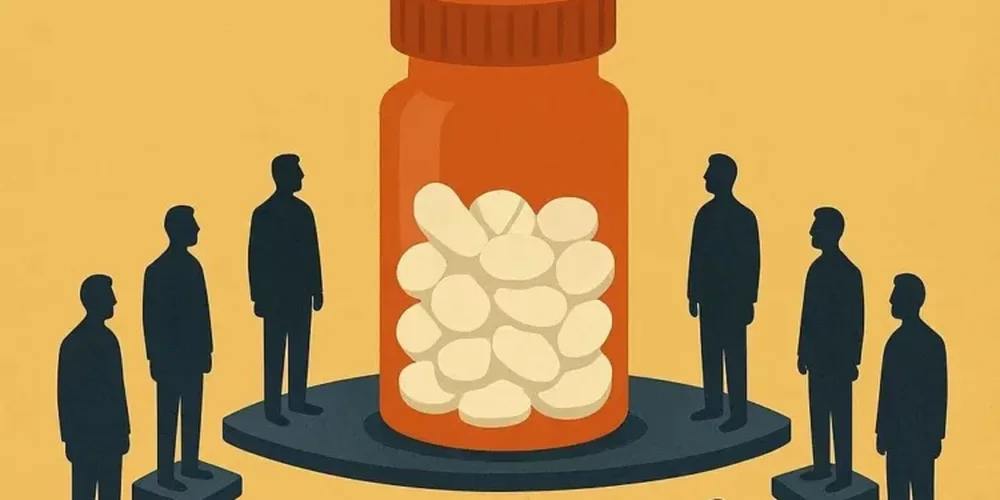
In a rather well-organized process, a large domestic manufacturer, eight wholesale import-distribution entities, and reasonable suspicion of price and quality fixing, have turned 3,069 licensed pharmacies across the country into stores selling products dictated by drug wholesalers.
In addition to the market dominance by large manufacturing and marketing entities, experts in the field raise concerns about the decline in the quality of medications, not only those that are reimbursable but also those sold in open pharmacies.
"The Albanian market for open network pharmacies is sinking under the clutches of monopolization," Diana Toma, former president of the Order of Pharmacists, tells Faktoje.al.
Even state institutions themselves note the monopolization of the market in determining the price and types of medications, leaving the production and wholesale-retail trade chain process in the hands of a few entities.
"The price of medicines in the pharmaceutical market is not a competitive element since its fixation for at least a 6-month period and its determination on the control stamp makes it unchangeable, thereby limiting competition with product prices in the pharmaceutical market by the actors of this market." This is the conclusion reached by the Competition Authority after a long investigation, issuing a final (last) report in October 2022.
Full price-product control!
"There are 3069 licensed pharmacies in Albania; importers and distributors in the pharmaceutical market (Wholesale of medicines) have 233 licenses; manufacturers in the pharmaceutical sector (Production of medicines) have 10 licenses and hospital pharmacies (Hospital services) have 27 licenses," says the National Business Center (NBC) to Faktoje.al.
Although 233 licenses have been granted for pharmaceutical wholesalers, their real number is much smaller.
An investigation by the Competition Authority shows that in 2022 there were 13 large pharmaceutical companies.
Meanwhile, from the verifications of Faktoje.al and after processing the data that also comes from the investigation of the Competition Authority, it results that there are currently only eight large entities that control the market, but after opening subsidiaries with other trade names, they "cover" their activity, which gives the 'de jure' idea that there are many wholesale companies in the country.
"In the pharmaceutical market we have such a stratification; import-distribution is one category and manufacturers are another category, but the products of both categories are distributed to citizens through open network pharmacies. The end of the funnel is the open network pharmacy. Part of it goes to hospitals through tenders, and another part is distributed to citizens in pharmacies," says Toma.
Large manufacturing entities
Faktoje.al referred to the Competition Authority's investigation, which in a detailed analysis clearly distinguishes only one domestic pharmaceutical manufacturing company, Profarma, and eight other trading companies.
The Central Bank of Kosovo has 10 registered manufacturing entities, but Diana Toma specifies that "only one company is a pharmaceutical manufacturer (Profarma), while the other companies produce technical medical products or parapharmaceutical products."
The Competition Authority in the same report (last October 2022) reviewed the pharmaceutical market and found that: "Based on the analysis of data on the value of medicines produced in the country and marketed by companies authorized for production and marketing, it resulted that the company Profarma is the largest pharmaceutical manufacturer in the country, followed by Noval and Florfarma. From a cross-reference of data filed by Profarma SHA and FSDKSH (list of reimbursable medicines), it is found that in the list of reimbursable medicines, Profarma products are in almost all cases, the cheapest alternative within generic medicines," says the CA, which also finds no violation, since although it sees market dominance, it covers it with the low price of medicines, especially reimbursable ones.
Trading entities
The Competition Authority in its investigation emphasizes that state institutions, especially the National Agency for Medicines and Medical Devices (AKBPM), had not made available the relevant documents on the manufacturing and trading companies, how many medicines they have imported and on their quality. However, the Competition Authority concludes that for 2022 “the largest importers of medical medicines are (Rejsi Farma SHPK, Incomed SHPK, Evita SHPK, IMI Pharma SHPK, Trimed SHPK, Aldosch Farma SHPK, Fufarma SHA, Pegasus SHPK, CFO Pharma SHPK, Delta Pharma-AL SHPK, Megapharma SHPK and Intermed SHPK)”.
The CA also finds that a commercial entity has dominated throughout 2020 with the "anti-flu vaccine", considering this a violation, as about 75% of this vaccine was only available in open pharmacies, a network of this importing entity.
“At the end of the investigative procedures, the Competition Authority found that: 'the fixing of the selling prices of medicines at each level of trade, as defined in the Council of Ministers No. 143, dated 18.2.2015 “On the determination of the margins of trade and manufacture of medicines”, points 1, 2 and 3, leads to a restriction of competition in the wholesale and retail trade of medicines”. This same institution also finds that, “the existence of vertical integration of pharmaceutical importing companies and retail network pharmacies may lead to the creation of a dominant position in the market”.
Despite the position of the Competition Authority, the pharmaceutical market in the country has not only not changed, but is being increasingly controlled by a small group of manufacturers and wholesalers and retailers of medicines.
"...In the open pharmacies, there are large importing companies that seem to have expanded from wholesale to the end. They have opened their own pharmaceutical networks," says Toma, adding that this has led to "complete monopolization of production, large pharmaceutical warehouses, distribution and then retail trade through their networks of open pharmacies."
Open the pharmacy...!
Three controversial laws of 2009, 2014 and 2015, under the slogan of a great opening for the licensing of many pharmacies and the reduction of drug prices, seem to have already brought about the domination of the pharmaceutical market by a small group of businessmen, one domestic drug manufacturer and eight large importing entities who also have retail pharmacy networks to close the production-trading-sales cycle.
In 2009, Parliament approved Law 10081, on licenses and permits, proposed by the government.
"If until 2009 we had permission to open pharmacies from the Ministry of Health based on professional criteria, distance, etc., after the adoption of this law, these criteria were abolished and with the desire of any individual who found an environment even next to another pharmacy, only through a self-declaration made to the Central Pharmacy Council, they enjoyed the right to open a pharmacy," Diana Toma, former president of the Order of Pharmacists, tells Faktoje.al.
"In 2009, when everyone was given the right to open a pharmacy, the connection between the pharmacist and the pharmacy owner was severed. The burden of responsibility was left to the technical director and in this way, we created an artificial shield for the pharmacy owner to commit violations without any hassle, since the 'bills' would be paid by the technical director of the pharmacy, who was no longer the owner of the entity," says Toma, while insisting that this form removed the professional pharmacist from the market and gave importance to the commercial concept in the health field as well.
The two laws that removed quality and 'captured' the market…!
In 2014, former Minister of Health Ilir Beqja promised for several months radical changes to the health system in the law on medicines for the pharmaceutical service, promising price reductions and state control. Also, amendments to this law a year later cemented the pharmaceutical industry in the country, predetermining prices, quality and indirectly also the companies that would have more access to this important market. “The origin of the medicines that came as substitutes, of patent medicines, will definitely have the cheapest prices, but this brought a suffocating atmosphere for prestigious companies,” says Toma. "We have many pharmacies that are going bankrupt and that are owned by professional pharmacists and the number of these pharmacies that are owned by these networks is increasing. We see that pharmaceutical networks sell products cheaper than we buy them in the warehouse. What phenomenon are we facing? Before the phenomenon that is being invested to close other pharmacies, which is a violation and closure in a dishonest way, or before the phenomenon that is being laundered money," emphasizes the former president of the Order of Pharmacists.
Who controls?
The National Agency for Medicines and Medical Devices (AKBPM) in an official response to Faktoje.al said that in our country the following are authorized for sale:
"Medicines produced in our country; medicines that have received marketing authorization and are circulating in one of the countries of the European Union, the United States of America, Canada, Turkey, Switzerland, Israel, Japan, Australia, Norway, Iceland and the United Kingdom; medicines that have received local marketing authorization and are circulating in the country; medicines produced in the Balkan countries, only when they have received marketing authorization and are circulating in their country and medicines equipped with marketing authorization from (EMA) or (FDA)".
Although there are five authorizations, the market for hospital use and in private pharmacies is dominated by drugs produced in our country, Turkey, or one of the Balkan countries, mainly Serbia.
"The prestigious foreign companies that were there until that time (2015) were legally forced to leave, or they realized that the government's decision would lower prices, which meant they would have no market," says pharmaceutical expert Diana Toma.
According to her, the forced departure of large pharmaceutical companies was not unintentional. "The market shift, in my opinion, was done only for pure profit interests for a certain layer or category of individuals, without taking into account the importance of the presence of pharmaceutical representatives in Albania, which in themselves are guarantors of the stability of the pharmaceutical market of a country"/ Faktoje.al






















